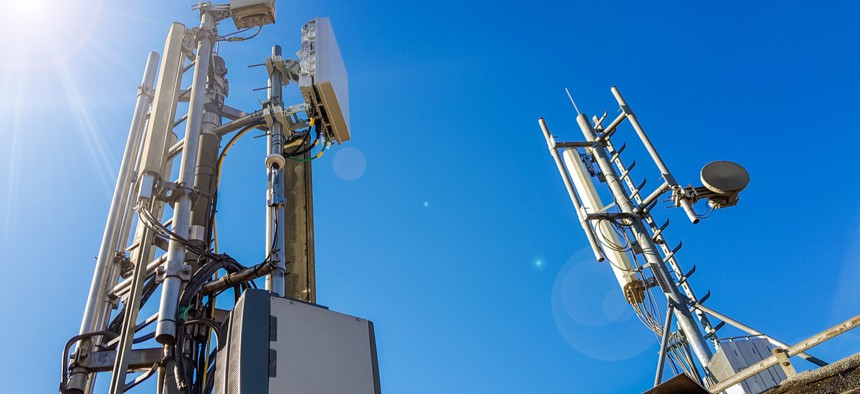Telecom Officials Defend America’s Position on 5G Landscape

TPROduction/Shutterstock
American companies may not be Huawei, but they're innovating 5G in their own ways.
Talk around emerging wireless technologies is frequently overshadowed by concerns that there’s a "race to 5G’" in which America is lagging, but the nation’s 5G industry is vibrant and U.S. makers produce many components already ingrained in the budding tech, telecom and policy officials said Wednesday.
“We are misleading ourselves and others by saying that the U.S. is behind or that 5G is not happening here,” Thierry Maupilé, executive vice president of telecom startup Altiostar, said at a panel hosted by the Center for Strategic and International Studies. “Talking about the U.S. industry, there’s a lot of innovation.”
CSIS Senior Vice President and Director of the organization’s Technology Policy Program, James Lewis, opened the event with a note that in a recent conversation, senior officials asked him if America can build its own Huawei—referencing the prominent but embattled Chinese telecommunications producer the Trump administration recently barred for infiltrating American supply chains with possible threats to national security.
“That’ll probably be the only time we will use the word ‘Huawei’ here and the answer is no, of course, we cannot build our own Huawei—and not only can we not build it, we cannot afford it,” Lewis said. “But we may not need to because what technologies we use to connect over networks will be in the future is changing.”
Other panelists agreed. Chris Boyer, AT&T’s president of global public policy said hoping to build an American Huawei is “an old school way” of addressing a very complex issue. He also said innovations around 5G will happen globally.
“A lot of value proposition from 5G is going to be from the applications that lay on top of the infrastructure and those different use cases and devices that are connected to that and that can be developed anywhere,” Boyer said. “I think the issue now ought to be, how do we incentivize innovation in the software that runs on top of the network components as a way to really innovate and that plays to some of the strengths the U.S. has in certain areas.”
Boyer also referenced a CSIS report from December that suggests America is a leader in making subcomponents of the technology.
“As a policy guy, I would say that this idea that no innovation is happening in the U.S. is just wrong. That’s not accurate,” Boyer said. “AT&T has been very active trying to drive innovation in this space and a lot of innovation is happening in the U.S.”
Oracle’s Director of Cybersecurity Travis Russell also warned attendees to be wary of 5G announcements that imply the tech has been fully integrated and deployed, when in reality, mobile broadband standards and specifications have not yet been set. Russell is a member of the 3rd Generation Partnership Project, or 3GPP, an organization that develops protocols for mobile telecommunications technologies.
“How can you have a true standalone 5G network if the specifications have not been defined yet?” he asked.
Despite these reassurances, when Lewis opened questions to the audience, speculation ensued. Australia's inaugural Ambassador for Cyber Affairs Dr. Tobias Feakin said America really hasn’t been visibly present among international dialogues around 5G.
“It’s really heartening to hear that there’s an amazing 5G industry here in the U.S. I work in the Asian-Pacific and it’s invisible—it’s just not there,” Feakin said. “I am in the middle of those discussions with so many different countries, and I don’t see U.S. industry in the middle of that too and that worries me.”
In response, Boyer said part of that problem is strung from the fact that global discussions around 5G are still fairly new.
“I don’t think these issues are well understood and I think a lot of the conversation has been unfortunately fixated on what to do about a particular entity as opposed to focused on how do we really create the right incentive structures for innovation,” he said.
Lewis added that, while they may not be present in global discourse, American companies supply much of the tech that makes up 5G infrastructure.
“The fact that you can’t see them doesn’t mean they aren’t there,” he said.
NEXT STORY: ICE and the Ever-Widening Surveillance Dragnet






